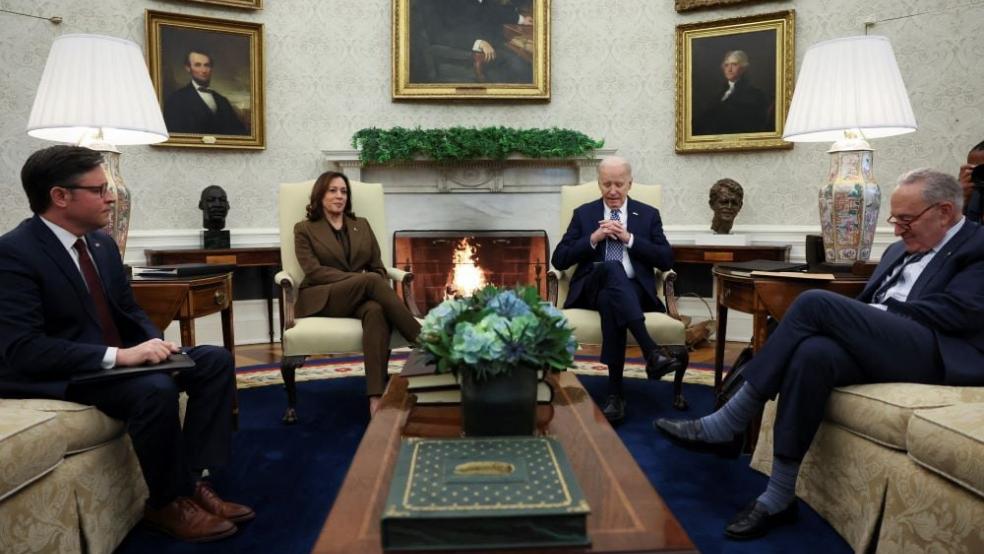Just days away from a partial government shutdown, President Joe Biden met with congressional leaders at the White House Tuesday in an attempt to break a deadlock over federal funding and to discuss a stalled supplemental bill that would provide aid to U.S. allies including Ukraine and Israel.
Senate Majority Leader Chuck Schumer said after the meeting that the attendees — House Speaker Mike Johnson, House Minority Leader Hakeem Jeffries, Senate Minority Leader Mitch McConnell and Vice President Kamala Harris, along with Biden and Schumer — agreed that no one wants to see a shutdown.
“We are making good progress,” Schumer told reporters. “The speaker said unequivocally he wants to avoid a government shutdown.”
Johnson expressed hope a shutdown would be avoided. “We’re very optimistic,” he told reporters. “We believe that we can get to agreement on these issues and prevent a government shutdown, and that’s our first responsibility.”
The Departments of Transportation, Housing and Urban Development, Veterans Affairs and Agriculture will shut down starting Saturday if lawmakers are unable to reach an agreement, and a second shutdown covering the rest of the government would begin one week later.
Schumer said that to avoid a shutdown, lawmakers will have to pass yet another short-term funding bill known as a continuing resolution, or CR, as they work on spending bills distributing the agreed-upon $1.66 trillion discretionary budget for fiscal year 2024, which began in October.
“We made it clear that that means not letting any of the government appropriations bills lapse, which means you need some CRs to get that done, but we’re making good progress and we’re hopeful we can get this done really quickly,” Schumer said.
Pressure on Ukraine aid: The meeting included a discussion of the $95 billion foreign aid package passed by the Senate that Johnson has refused to bring to the House floor for a vote. “The meeting on Ukraine was one of the most intense I have ever encountered in my many meetings in the Oval Office,” Schumer said. “It was intense because everyone in that room was telling Speaker Johnson how vital” it is for the U.S. to provide more aid.
Schumer said the assembled leaders tried to impress upon Johnson that waiting any longer to provide additional military aid could result in Ukraine losing the war and the NATO alliance being fractured. “We said to the speaker, get it done,” Schumer said. “I told him, this is one of the moments ... history is looking over your shoulder and if you don't do the right thing, whatever the immediate politics are, you will regret it.”
Johnson, however, has insisted that lawmakers address the situation at the southern border before providing more aid to foreign allies, and his comments Tuesday did little to suggest that he has changed his mind on the matter. House Republicans are working on providing aid to Ukraine in a “timely manner,” Johnson said. “But again, the first priority of the country is our border and making sure it’s secure,” he added. “We must take care of America’s needs first.”
Schumer said the meeting attendees tried to convince Johnson that holding up aid to focus first on the border is a “non-sequitur” that will harm Ukraine. “There’s a logic to solving the border, we want to solve it,” Schumer said. But, he said, the Ukraine aid can’t wait any longer and there’s “broad bipartisan consensus” for it, while a border agreement will take more time.
Johnson’s dilemmas: While the House speaker expressed optimism about avoiding a shutdown, it seems likely that, as Schumer noted, lawmakers will have to pass their fourth continuing resolution of the fiscal year in order to do so. That could be a tricky issue for Johnson, who has indicated that he doesn’t want to pass any more of the short-term bills, which are unpopular among conservatives.
Johnson also faces pressure from hardliners to his right who don’t mind if the government shuts down, even if it’s politically damaging and runs the risk of hurting Republicans in the fall, threatening control of the speaker’s gavel. Some hardliners would prefer to skip the bipartisan funding bills altogether, opting instead for a full-year continuing resolution that would generate a 1% spending cut across the board under the terms of the Fiscal Responsibility Act of 2023. That would almost certainly meet resistance in the Senate, however, once again raising the threat of a shutdown.
In another wrinkle, Republicans who are working on the 2024 spending bills are seeking to include policy riders that could conceivably deliver political victories on culture-war issues like abortion and trans rights but would also make it much more difficult to pass the legislation amid resistance from Democrats.
The supplemental spending bill providing $60 billion in aid for Ukraine presents yet another quandary. Johnson could bring the bill to the floor for a vote, where it would likely pass with overwhelming support from Democrats. But that would inevitably inflame nationalist hardliners who have become increasingly skeptical of U.S. involvement in Ukraine — and who could trigger a vote to remove Johnson from the speakership.
The bottom line: It appears that lawmakers will once again punt on government funding and push the threat of a potential shutdown to a later date. But that will only temporarily relieve pressure on congressional leaders, especially Johnson, who faces a series of politically perilous decisions on both the budget and foreign aid.




